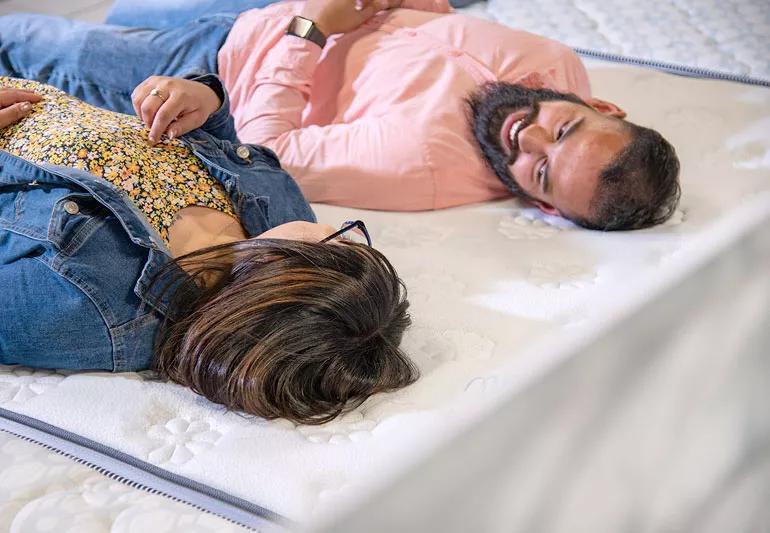Look for a firmer mattress and then make adjustments as needed

Image content: This image is available to view online.
View image online (https://assets.clevelandclinic.org/transform/963cafc6-67ce-4996-9b38-4d9e248ab950/couple-Tests-Mattress-1368179318-770x533-1_jpg)
A couple lie on a mattress at the store to test firmness.
Archeologists searching caves above a South African river found evidence of the world’s first mattresses. These sleeping mats made of leaves and grass date back an estimated 77,000 years.
Advertisement
Cleveland Clinic is a non-profit academic medical center. Advertising on our site helps support our mission. We do not endorse non-Cleveland Clinic products or services. Policy
Consider that the start of humankind’s quest for the perfect sleep surface.
A comfortable mattress is key to a good night’s sleep — and thankfully, we’ve advanced well past leaves and grass. But the question is: What kind of mattress offers the most optimal slumber? Chiropractor Andrew Bang, DC, has some suggestions.
A classic bedtime story might be the best game plan for selecting a mattress. Basically, take the Goldilocks approach: Not too soft, not too hard, but just right. That’s typically a mattress that carries a medium-firm designation.
Research shows that a medium-firm mattress can improve sleep quality by 55% and help reduce chronic back pain.
Another bonus? A firmer mattress gives you options. “Starting on the firmer side allows you to make adjustments as needed,” says Dr. Bang. “You can always add softness to a mattress by using a foam topper or other type of topper for more give.”
Adjustable mattresses are on the market, too. Air chambers within these mattresses can be deflated or inflated to customize firmness. “It gives you a lot of control to meet changing needs,” notes Dr. Bang. (Wallet warning: Adjustable mattresses tend to be pricey.)
Manufacturers use their own methods to rate and describe firmness, as there’s no set standard for the industry. That means a medium-firm mattress from one company may feel vastly different than another.
Advertisement
So, spend time lying on mattresses in a showroom to see what feels comfortable and what feels like an ache waiting to happen.
“Be your own investigator,” advises Dr. Bang. “You’re the best source for what feels right to you.”
And check on the return policy for a mattress in case it doesn’t work out. Many manufacturers offer that option. “Even if you have to pay a fee, it’s worth it,” he adds. “You don’t want to be stuck with an uncomfortable mattress for years.”
It’s possible to buy a mattress with a 20-year or 30-year warranty. The product may even hold up that long for you. Here’s the issue, though: Your body can change a lot over a few decades, notes Dr. Bang.
“What you’re looking for in a mattress will probably change as you age,” he continues. “What’s right for the 30-year-old you might not be the best choice for the 50-year-old or 60-year-old version of yourself.”
Given that, it’s best to change mattresses about every 10 years — especially if you’ve experienced physical changes such as an injury or a significant weight gain or loss.
Keep tabs on the physical condition of your mattress, too, as well as the box spring or frame. If they look worn … well, they probably are. “Any of these can lose their integrity over time — and that’s not going to help you sleep,” says Dr. Bang.
Your mattress is important when it comes to getting a good night’s rest, but it’s not the only thing that matters. If you’re waking up with aches and pains, you also may want to consider:
Think of your mattress as a significant purchase that deserves your attention, time and research. “You’re going to spend about one-third of your day on it,” says Dr. Bang. “That makes it a big deal.”
Advertisement

Sign up for our Health Essentials emails for expert guidance on nutrition, fitness, sleep, skin care and more.
Learn more about our editorial process.
Advertisement
Sleep masks can help you create total darkness so you can sleep better
To avoid sleep deprivation and shift work sleep disorder, try adopting habits that minimize light exposure and prioritize daytime sleep
Sleep disorders, mental health conditions and other health concerns can all affect the quality of your sleep
Most people fall asleep within 10 to 20 minutes, but if your experience is different, adjusting your sleep schedule may help
Stick to a consistent schedule, be mindful of screen time and work on reducing your stress levels before bed
Napping can boost focus, memory and mood — if you time it right
These devices can help shed light on what’s happening with your body during rest
Keep a dream journal, set your intentions before bed and make sure you’re getting a full night of high-quality sleep
Prioritize your health by managing stress, strengthening your social connections and getting quality sleep
Bolsters, blankets, pillows and blocks can offer extra support, stability and comfort
Allergies, postnasal drip, asthma or reflux could be to blame for a cough that won’t quit